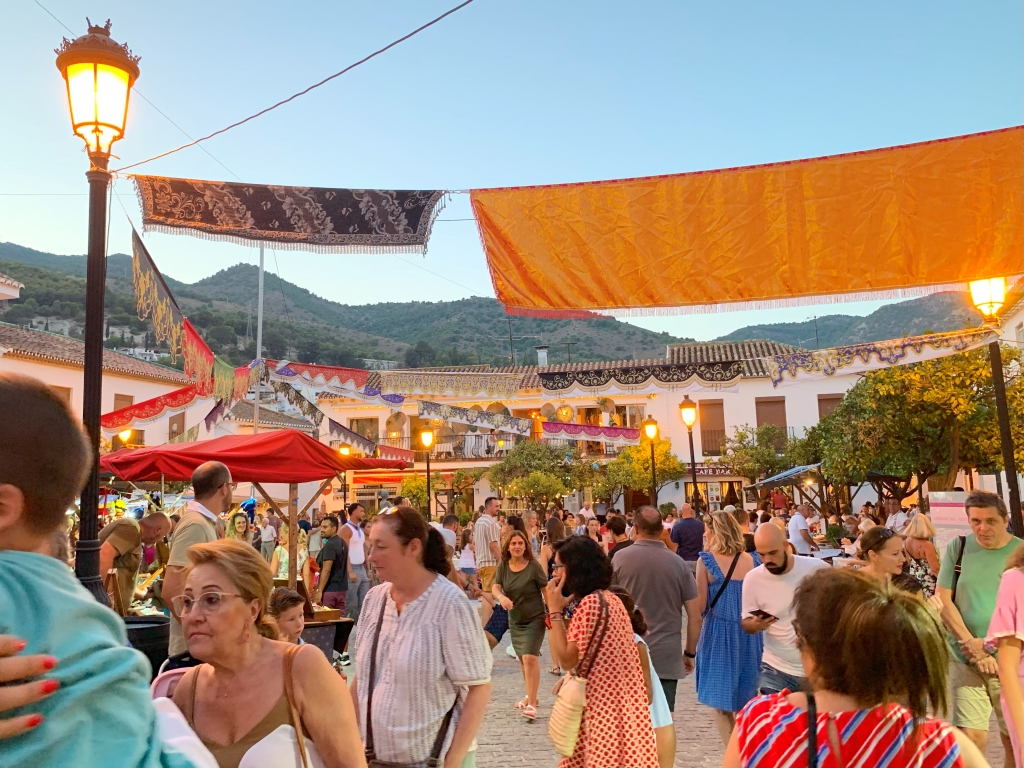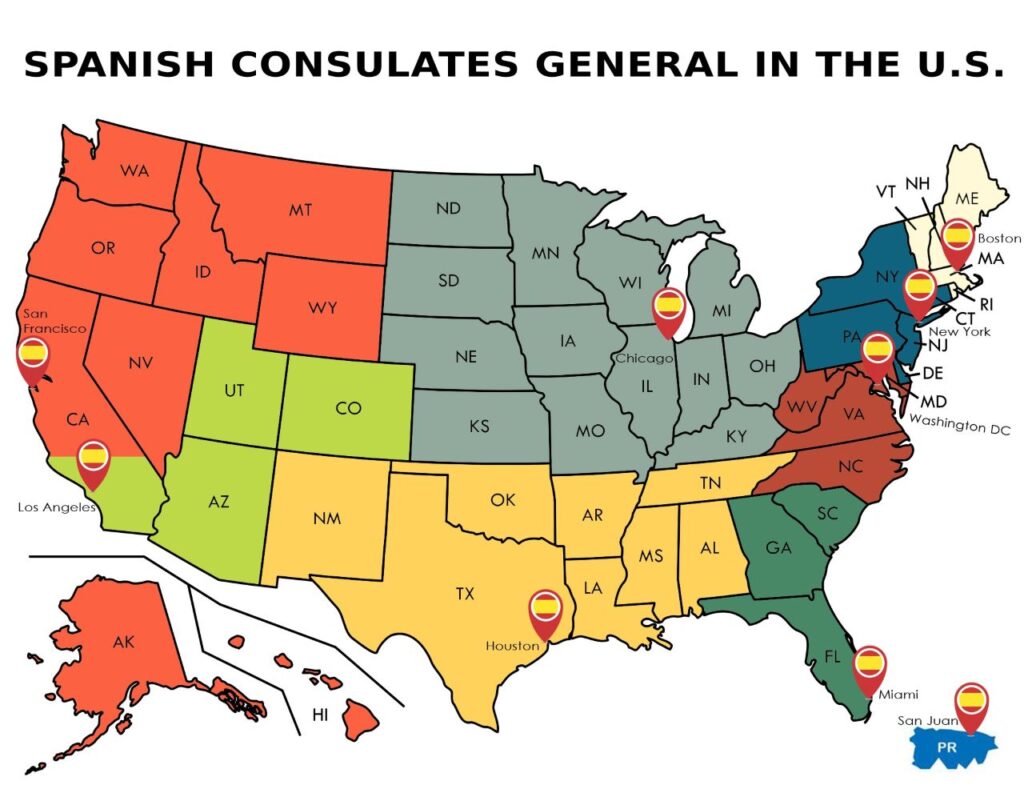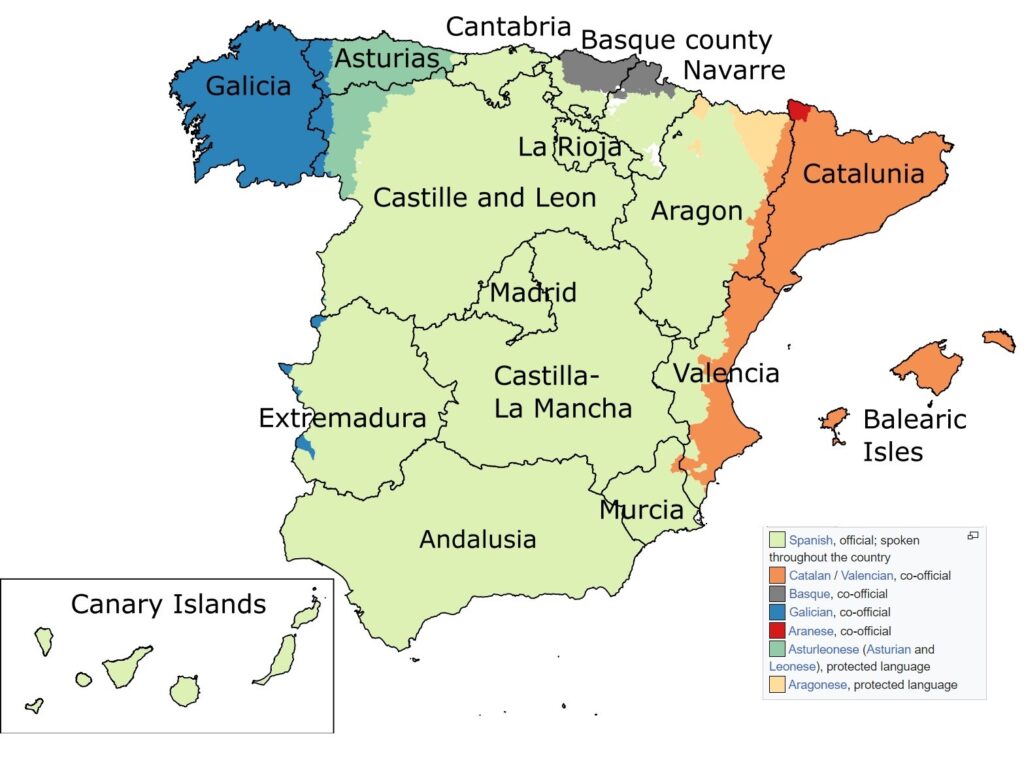July 24, 2024
So, you’ve been dreaming about Spain but getting a visa seem to be a big obstacle. It can be, but there are ways to get a visa to live in Spain (legally, of course) that you may not know about – it is doable and, with a bit of planning and patience, the visa may not be so much of a problem.

Here is a list of visas provided by Spain that would allow a non-EU citizen to live in the country. See if you or your partner can fit in one – or even more! – and maybe dreams can come true. 😉 Let’s go!
Table of Contents
The easy way – family of EU citizens
If you are from the European Union (EU), great, your problem is solved, you can come anytime. If you have double nationality, and one of them is from the EU, of course, you count as an EU citizen, so you can simply move in – there are a few requirements after moving, such as getting your local documentation, but those requirements would be there anyway; the point is that you don’t need a VISA.
If you don’t have EU nationality, see if you can have. Spain, Italy, Ireland, Portugal and maybe more countries offer nationality to descendants; so, if one of your grandparents was (or is) from these countries, you can be eligible to become an EU citizen, and therefore not need a Visa.
Another easy way is if you happen to be married to someone that either is from the EU or that descends from an EU-country national. You wouldn’t get their nationality but could come to Spain as the partner of an EU citizen. If the grandmother of your spouse is, for instance, Italian, your spouse can become Italian, can move to Europe – Spain included – as an EU national, and so can you, for being the spouse of an EU citizen.

What about non-married couples?
It is possible to obtain a Visa for an unmarried partner, but one would have to provide documents proving that the partnership is analogous to a marital relationship for at least 1 year, for evaluation in the Consular Office. This means that there are no strict guidelines here on what documents would need to be presented, and the final word would come from the Consular Office.
In that case, I’d imagine something on the lines of joint bank accounts, or utilities bills for the same address in the name of both individuals would be acceptable to prove the relationship, but the best way would be to contact the Spanish Consulate that covers your area to ask what they would find acceptable. The page of the Embassy of Spain in the US states that when there are children in common, it will be sufficient to ascertain stable cohabitation.
To see the documents and other requirements for this Visa, look for Visa for Family members of a citizen of the European Union in the Spanish Consulate page.
Related post:
Visa for EU family members (or my big, big mistake)
The most common way – Non-Lucrative Visa
The Non-Lucrative Visa (NLV), also known as Non-Working Visa, comes with a catch, clearly stated in the name: the visa holder cannot work in Spain, either being employed by a company or as self-employed. Nothing stops the NLV holder to either have a job abroad, as a remote worker (though the digital nomad visa would be more adequate) or to own properties in Spain (or abroad) and live from the rent, for instance; the main target of this visa type, though, are retired people, so that they can come to Spain enjoy their retirement years by the beach – while bringing foreign money to the country.
The NLV lasts for one year, but can be renewed or changed, even from within Spain, to some other Visa type. This means one can come to stay one year in Spain and if, during that time, find a place to work, the NLV holder can change the Visa to one that allows working in the country (starting after the one-year ends, and after the new visa is obtained). But, please, don’t think it is easy; Spanish employers wouldn’t go all the way around the bureaucracy to hire a foreigner unless it is for a highly qualified position that they can’t fulfill otherwise.
A more realistic approach would be to come for one year to check if living in Spain would be for you, and then later exchange the visa for a self-employed work visa (more about it in the respective topic ahead) or to a golden visa. One can also renew the NLV for four more years and then, after one has lived in Spain for five years, exchange it for a permanent residence permit – and then there are no more work-related restrictions.

How long can I stay out of Spain with an NLV?
To keep residency rights, including being able to renew the NLV or exchange it to another long-term Visa, the NLV holder should not leave Spain for more than 6 months in a year or a total of 10 months during the first 5 years living in Spain.
To see the documents and other requirements for this Visa, look for Non-Lucrative (or Non-Working) Residence Visa in the Spanish Consulate page.
Related post:
Spanish Non-Lucrative Visa and Digital Nomad Visa – Interview with Tarragona Legal
The newest way – Digital Nomad Visa
A digital nomad in Spain is someone who can work remotely for companies located outside Spain through the exclusive use of computer, telematic, or telecommunication means – hence the name; ‘digital’ is a big part of it. In Spain, a digital nomad (or teleworker) is broadly defined as an individual who relies on telecommunications technologies to earn a living and conduct their professional activities remotely.
This can include freelancers, entrepreneurs, remote employees, and anyone else whose work is location-independent and predominantly carried out online. Whether you’re a software developer, a graphic designer, a writer, or an online consultant, as long as your work can be performed remotely, you may qualify as a digital nomad under Spanish law.

By Spanish rules, the teleworker can either be employed by companies located outside Spain or conduct self-employed activities (as freelancers). The self-employed may also work for companies located in Spain, provided that the percentage of such work does not exceed 20% of their total activity. To obtain this visa, it is necessary to either have a graduate or postgraduate degree from prestigious universities, vocational training centers or renowned business schools, or to demonstrate a minimum professional experience of three years.
It is also necessary that the employer agrees with the idea of the digital nomad to move to Spain, as a lot of the documentation for this visa will be provided by the company for which the future nomad works. To see the documents and other requirements for this Visa, look for Digital Nomad (or Telework) Visa in the Spanish Consulate page.
Related post:
Spanish Non-Lucrative Visa and Digital Nomad Visa – Interview with Tarragona Legal
The in-between way – Self-Employed Work Visa
You can get a visa to live in Spain if you can prove to the Spanish authorities that you can be self-employed. Good right? It is a good start, but the list of requirements may be a bit difficult to obtain; I guess a lawyer would be a great help for this visa. You’d have to present to the Spanish authorities a list of permits or licenses required for the installation, opening or operation of the planned activity or professional practice, indicating the status of the procedures for obtaining them.
There would also be a need to prove you are qualified to perform such activity and a plan for the establishment or activity to be carried out, indicating the planned investment, the expected return, and, where applicable, the jobs that would be created. The documents written in a foreign language must be submitted together with an official translation into Spanish.
I call it an in-between way because to me, this visa seems to be in the middle of the Digital Nomad and the next one, the entrepreneur visa, which requires bringing a business to Spain. I suppose it wouldn’t suit IT related workers, since the digital nomad applies precisely to them; youtubers and bloggers would also qualify as Digital Nomads; on the other hand, professionals such as dentists or veterinarians would require a clinic to work from; a chef would require a restaurant; so, I’m not sure if they would qualify as self-employed or as entrepreneurs.
The final word would come from the Consulate – it is up to them to decide if they think your plan will work or not or, more precisely, if it would be in Spain’s best interest to have this work being provided. If you want to follow this path, it would be advisable to find an area in Spain in high demand of your activity, and prove this need to the Spanish authorities, too. To see the documents and other requirements for this Visa, look for Self-Employed Work Visa in the Spanish Consulate page.

The probably hard way – Entrepreneur Visa
Suppose you and your family own a business in your home country, and you would like to come to live in Spain and bring your business with you. There is a visa for just that! It is the entrepreneur visa, which encompasses both big companies and business projects. For both cases, though, there is the need to have favorable reports from Spanish government institutions.
A business plan would need to be presented, detailing the project, market analysis and financing; it should highlight the potential for creation of jobs in Spain and the added value for the Spanish economy, innovation or investment opportunities.
As with the self-employed, the final word would come from the Consulate, but here I think the word of the Spanish Institution in charge of evaluating the project would have a big impact on the final decision. To see the documents and other requirements for this Visa, look for Entrepreneur Visa in the Spanish Consulate page.
The rich way – Golden Visa or Investor visa
You can buy your way to live in Spain with an Investment Visa. It requires one of these: an initial investment of at least 2 million euros in Spanish public debt securities, or 1 million euros in stocks or shares in Spanish companies or in investment or venture capital funds incorporated in Spain, or in bank deposits in Spanish financial institutions. But there is one more way:
The preferred means which more than 90% of the people that got an Investment Visa opted for is to purchase real estate for a minimum of 500,000 euros (either one or several properties). If that is how you plan to come to Spain, you gotta hurry: there are serious talks that the Golden Visa is going to stop being a possibility soon – but for now it is still valid. To see the documents and other requirements for this Visa, look for Investor Visa in the Spanish Consulate page.

The almost unheard-of way – Getting a job in Spain
This is unusual. Jobs in Spain are famously hard to find – sorry, I don’t mean to be a pessimist, I just don’t want to create false illusions either. And hey, maybe you are the exception! The thing is that Spain is quite bureaucratic, and hiring someone from abroad would imply making a lot of paperwork. It can happen, sure, but it is not something that a small or medium company would do; it is more something that a big company, that has a lawyer department on the payroll, could do if it felt an absolute need, or if they are opening a branch in Spain.
To get this visa, you would first need to get a work contract, as this is part of the visa application documents, but much like in the US, companies would prefer to hire someone that is either local or that already has the work permits, residence and all documentation in place. That is why this visa is uncommon and almost only used in extreme situations: Nobel laureates, soccer players that make millions, or harvest workers, that are sometimes hard to find in the amounts needed during the olive-harvesting season.
For an uncommon visa, this one has quite some variations: look for Internship Visa, Employee Visa, Researcher Visa or Visa for highly qualified workers or intra-company transfers in the Spanish Consulate page.
A bit more about visas and visa consequences
There are a few more things we should talk about in this topic that I’m sure will make things clearer and save you a few headaches along the way. There is a lot of confusion when it comes to immigration laws vs taxes laws, amount of money to get a visa and to live in Spain, healthcare insurance requirements etc; so here is an overview of the more common confusions:
Family Members
The visa holder can extend the permission to live in Spain to the following family members: the spouse (or unmarried partner); their own minor children and dependent relatives in the ascending line (mother or father that require assistance).
Each of these members will have to provide documents and will need to make Spanish documents after arrival as well, but the documentation needed is less extensive than for the main visa solicitant.

Money requirements
Every visa type requires proof that the person asking for a visa has the means to maintain oneself and the family members in Spain. The amount of money required varies from one visa to another, but is always calculated based on the IPREM, a public indicator that is updated once a year. You can check the current value of the IPREM in its official site.
In 2024, the IPREM is 600 euros per month; so, a requirement of 200% of the IPREM, for instance, would mean they expect the visa solicitant to be able to prove they earn at least 1200 euros per month or already has 12 times that amount in the bank (for a one year permit). Each family member added to the visa request increases the amount needed to be proved.
Healthcare requirements
UK national don’t need to worry much about healthcare coverage, as the NHS and the Spanish Social Security Institute have agreements in place to help one another; people from other nationalities, though, have to contract a health insurance (not a travel insurance) that offers a similar coverage as the Spanish public healthcare.
The health insurance must not have a deductible, copayment, or coverage limit; it must cover 100% of the medical, hospital, and out-of-hospital expenses. It must cover all risks normally covered for Spanish nationals and must be maintained for the entire duration of the authorization. I would recommend contracting this Insurance from one of the many companies that provide this service in Spain, as they are familiar with the details of the coverage needed for visas.
What comes after the Visa?
Let’s not mix visa validity with the period of allowed stay – I see how this could be confusing, so let me clarify: most Visas are valid for only 90 days after entering Spain. This means that, within those 90 days, one has to get a TIE, which is something similar to an ID card, or a foreigner ID card, so to speak; this TIE will have a validity that is the same as the period one is allowed to stay. The TIE should be requested within the first month of arrival; the 90 days is there to give the Spanish authorities plenty of time to issue it – and it is more than enough.
For instance, suppose you have a Visa that allows your stay for one year, and you arrive in Spain on May 1st. You’ll have 30 days to request the TIE, and within 90 days from arrival (in this example, up to July 29) you should have your TIE issued; this TIE, in turn, will be valid up to April 30 of the following year. If you intend to extend your stay, you can (on most visa types), and should do it before the expiration of your TIE.
It is a busy first month, as before getting a TIE, you’ll need to have a NIE – which you may get from abroad, in the same Consulate where your Visa was issued. It can save you some time doing both simultaneously and speed up the procedures left to do after arriving in Spain. I didn’t do my NIE in the Consulate, though; I did it in Spain, and both NIE and TIE were completed within the 90 days period.
Related posts:
What is a NIE and how to get one
Residence in Spain – TIE
Will I need to pay taxes in Spain?
Yes, that is for sure, unfortunately. Anyone who spends 183 days in a year in Spain is supposed to pay income taxes, regardless of the visa type that allowed them to come to live in Spain. Even if it is the Non-Lucrative Visa, which, by definition, implies that the visa holder doesn’t work. Once living in Spain, one is supposed to pay taxes in Spain on their worldwide income, so pensions or rentals from abroad are subject to be taxed in Spain, for as long as one lives in the country.
Citizens of the US are also supposed to pay taxes to the US, regardless of where in the world they live; therefore, to avoid double taxation, there are agreements between these two countries. US nationals living in Spain have to present tax forms to both countries; pay taxes to the one where they present it first and inform the second of the payment. If the payable amount to the second is bigger, they have to pay the difference; if not, no amount is due to the second country.
Moving to Spain, for US citizens, would likely imply an increase in taxes. The only way to go around it, as far as I know, would be to not come to live in Spain, but, instead, do like many British citizens do. British, Canadians and US citizens, among others, can spend up to 90 days in any 180 days period in Spain, without a Visa and without stablishing residence in Spain (they can own residential properties; residence papers and physical residence place are two unrelated things for this matter).
I know some people that do it; they keep coming and going dividing their time between two countries. Not a good option at all for people that either work or have school-aged children, but quite a nice way to live for the retired ones, as they keep in contact with family and friends in two countries!

Links to Spanish Consulate pages
Let’s make life easier, shall we? 🙂 Here is a complete list of Spanish Consulates (and Embassies’ consular sections) and their respective areas, or jurisdiction, for the USA, UK and Canada (the three English speaking, non-EU countries where most of my readers come from)!
Though generally the requirements are the same from one Spanish Consulate to the next, it is always better to check the pages of the Consulate that serves your area, as a few of the requirements can be location specific. Check the Consulate that corresponds to the area where you live, first; you can check other Consulate pages too, as different places explain their requirements slightly differently, and can help clarify some confusing requirements.
All information below comes from the page of the respective Embassy of Spain in each country.
USA

Consular Section at the Embassy in Washington, DC
Jurisdiction: Maryland, Virginia, West Virginia, District of Columbia, North Carolina
Consulate General in Boston
Jurisdiction: Maine, Massachusetts, New Hampshire, Rhode Island, Vermont
Consulate General in Chicago
Jurisdiction: Illinois, Indiana, Iowa, Kansas, Nebraska, North Dakota, South Dakota, Ohio, Kentucky, Michigan, Minnesota, Missouri, Wisconsin
Consulate General in Houston
Jurisdiction: Alabama, Arkansas, Louisiana, Mississippi, Tennessee, New Mexico, Oklahoma, Texas
Consulate General in Los Angeles
Jurisdiction: California (counties: Imperial, Kern, Los Angeles, Orange, Riverside, Bernardino, San Diego, San Luis Obispo, Barbara y Ventura), Arizona, Colorado, Utah
Consulate General in Miami
Jurisdiction: Florida, South Carolina, Georgia
Consulate General in New York
Jurisdiction: New York, Connecticut, Delaware, Pennsylvania, New Jersey
Consulate General in San Francisco
Jurisdiction: Alaska, Northern California, Hawaii, Idaho, Montana, Nevada, Oregon, Washington, Wyoming, US Pacific
Consulate General in San Juan, Puerto Rico
Jurisdiction: Puerto Rico, Islands of Culebra and Vieques, Virgin Islands
UK
Consulate General in London
Jurisdiction:
Greater London: Barking and Dagenham, Barnet, Bexley, Brent, Bromley, Camden, Croydon, Ealing, Enfield, Greenwich, Hackney, Hammersmith and Fulham, Haringey, Harrow, Havering, Hillingdon, Hounslow, Islington, Kensington and Chelsea, Kingston upon Thames, Lambeth, Lewisham, Merton, Newham, Redbridge, Richmond upon Thames, Southwark, Sutton, Tower Hamlets, Waltham Forest, Wandsworth, Westminster.
South West: Gloucestershire, Bristol (Unitary Athority – UA), Wiltshire, Somerset, Dorset, Devon, Cornwall and Isles of Scilly.
South East: Oxfordshire (Oxon), Buckinghamshire (Bucks), Berkshire (Berks), Greater London, Hampshire, Surrey, West Sussex, East Sussex, Kent, Isle of Wight. Eastern: Norfolk, Cambridgeshire (Cambs), Bedfordshire (Beds), Hertforshire (Herts), Essex, Suffolk.
The demarcation of the Consulate General of Spain in London also includes the dependencies of the Crown and the British Overseas Territories.
Crown Dependencies: Guernsey (Bailiwick of Guernsey) y Jersey (Bailiwick of Jersey).
British Overseas Territories (BOT): Akrotiri and Dhekelia, British Antarctic Territory, Tristan da Cunha, South Georgia and the South, Sandwich Islands, Falkland Islands, Gibraltar, Saint Helena and Ascension Island, British Virgin Islands, Turcs and Caicos Islands, Anguilla, Montserrat, Bermuda, Pitcairn Islands, British Indian Ocean Territory.
Consulate General in Edinburgh
Jurisdiction:
Scotland (Scotland or the Scottish Islands).
North Ireland.
England, including: Cleveland, Cumbria, Durham, Northumberland, Tyne & Wear y Tees Valley (Redcar y Cleveland, Stockton on Tees, Hartlepool y Middlesbrough).
Consulate General in Manchester
Jurisdiction:
Wales.
Isle of MAN.
England, including:
North West (excepto Cumbria): Cheshire, Greater Manchester, Lancashire, Merseyside.
Yorkshire and the Humber: East Riding of Yorkshire, North Yorkshire, South Yorkshire, West Yorkshire.
East Midlands: Derbyshire, Leicestershire, Lincolnshire, Northamptonshire, Nottinghamshire, Rutland.
West Midlands: Herefordshire, Shropshire, Staffordshire, Warwickshire, West Midlands, Worcestershire.
Canada
Consular Section at the Embassy in Ottawa
Jurisdicción: Región de la Capital de Canadá (Ottawa y Gatineau)
Consulate General of Spain in Montreal
Jurisdiction: Quebec, New Brunswick, Nova Scotia, Prince Edward Island & Newfoundland
Consulate General of Spain in Toronto
Jurisdiction: Ontario (except the National Capital Region), Manitoba, Saskatchewan, Alberta, British Columbia, Yukon, Northwest Territories & Nunavut
Conclusion
There are various ways to make the dream of living in Spain a reality. Whether you have a family connection to the EU, are ready to embrace a digital nomad lifestyle, or even plan to invest or start a business, Spain offers diverse visa options to suit different circumstances and aspirations. While the visa process requires careful planning and adherence to specific requirements, it’s entirely achievable with the right approach. Understanding each visa type, preparing the necessary documentation, and possibly consulting with professionals can smooth the journey significantly.
Remember, each visa has its unique advantages and challenges, so it’s essential to assess your situation and choose the most suitable route. Keep an eye on updates from Spanish consulates as regulations can evolve, and be prepared to adapt your plans accordingly. Embarking on this adventure means not only overcoming bureaucratic hurdles but also embracing a new culture, language, and way of life. Spain’s rich history, vibrant cities, stunning landscapes, and warm community are waiting to welcome you. Your Spanish dream is within reach! With patience, preparation, and persistence, you can turn your vision of living in Spain into a fulfilling reality. ¡Buena suerte!
Next: Effective ways to know your cost of life in Spain






